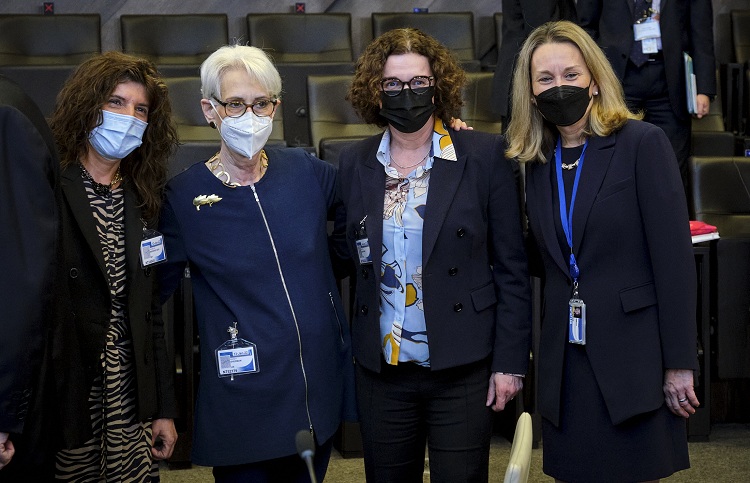The Diplomat
The Secretary of State for Foreign and Global Affairs, Ángeles Moreno Bau, participated yesterday in Brussels in the NATO-Russia Council, in which she defended the diplomatic path and the search for a “positive agenda” to resolve differences and respect for the territorial integrity of Ukraine, Georgia and Moldova.
Representatives of the 30 NATO allies and Russia met yesterday in Brussels to discuss the situation in and around Ukraine and its implications for European security. The NATO-Russia Council, which had not met since July 2019, is the main forum for dialogue and consultation between the Alliance and Moscow. The meeting took place after the extraordinary meeting of NATO foreign ministers, held on January 7 and attended by the minister, José Manuel Albares.
At the press conference following the meeting, the Secretary General of the Atlantic organization, Jens Stoltenberg, assured that Russia presented several proposals in the debate concerning its security, “these include demands to stop admitting any new members to NATO and to withdraw forces from eastern Allies”.
For their part, the allies reaffirmed “the right for each nation to choose its own security arrangements” and made clear that they “will not renounce their ability to protect and defend each other, including with presence of troops in the eastern part of the Alliance,” he continued. They also expressed their “serious concern about the Russian military build-up in and around Ukraine, and called on Russia to immediately de-escalate the situation, to respect the sovereignty and territorial integrity of its neighbours and to abide by all its international obligations and commitments.
In any case, the Secretary General assured, “both Russia and NATO allies expressed the need to resume dialogue and to explore a schedule of future meetings” and, in that sense, the member countries of the Alliance are “ready to meet again with Russia to have discussions in greater detail,
to put concrete proposals on the table,” such as transparency of military exercises, the need to avoid dangerous military incidents, space and cyber threat reduction, arms control, disarmament and non-proliferation, and nuclear policies. “These are opportunities for constructive engagement which should not be missed, in the interest of security in Europe,” Stoltenberg added.
During her turn to speak, Moreno reiterated virtually the same words delivered last week by Albares during the extraordinary ministerial meeting, in which he defended the dual approach of “the importance of unity among allies, dialogue and deterrence in defense of our values and principles and respect for Ukraine’s sovereignty and territorial integrity.”
As reported by the Ministry in a press release, Moreno Bau stressed the importance of unity among allies and diplomatic channels for resolving differences and advocated the defense of “our values and principles” and respect for the sovereignty and territorial integrity of Ukraine, Georgia and Moldova, and their internationally recognized borders. She also stressed the importance of existing international instruments, such as the 1975 Helsinki Act, the 1990 Charter of Paris for a New Europe and the 1999 Istanbul Charter on European Security, and called for the pursuit of “a positive agenda for the benefit of trust”.
In the margins of the meeting, Moreno had contacts with several of the heads of delegation, including those of France, Italy, the United Kingdom, the United States (Under Secretary of State Wendy R. Sherman and NATO Permanent Representative Julianne Smith) and Canada (Deputy Foreign Minister Marta Morgan), with whom she coordinated positions and addressed various areas of common interest.
Angeles Moreno had, last week, a telephone conversation with Wendy Sherman in which she discussed, among other matters of interest, the situation in Russia and Ukraine, “with the perspective of the next meeting of the NATO-Russia Council”, as she herself informed through Twitter. For his part, State Department spokesman Ned Price confirmed that Moreno and Sherman had spoken “about coordinating U.S. and European efforts to deter and impose significant costs on any additional Russian aggression against Ukraine” and had advocated “the use of diplomacy (…) to de-escalate tensions.”






